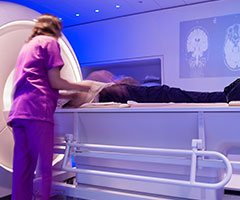Liver Cancer
What is liver cancer?
The liver is a vital organ that breaks down toxins, fats, and other nutrients in the body. When cancer develops in the liver it disrupts the ability to function normally. As a result, symptoms typically do not appear until the later stages of cancer.
In the United States, liver cancer is not common; however, cases are steadily developing. If you or your family has a history of cirrhosis or hepatitis B infection, testing for liver cancer is recommended to increase cancer survivorship.
Liver Cancer Treatment in Southwest Florida
The Lee Health Cancer Institute is helping patients all around Florida. If you are traveling from Naples, Bonita Springs, Estero, Cape Coral, Fort Myers, or Port Charlotte, we can help you navigate the next steps in treatment options. To learn more, call the facility at 239-343-9500
What are the symptoms of liver cancer?
Liver cancer symptoms can sometimes be difficult to identify since they are easily attributed to other noncancerous causes. The symptoms don't always become apparent until cancer has progressed to an advanced stage. Examples of some of these signs are as follows:
- A lump around the rib cage
- Abdominal pain
- Nausea
- Loss of appetite
- Weight loss
- Vomiting
- Dark-colored urine
- Chalky or pale stool
How is liver cancer diagnosed?
Lee Health oncologists use a variety of tests and procedures to screen for and diagnose liver cancer. Your primary care doctor may diagnose you with one or more of the following:
- Liver Biopsy
- Blood Tests
- Angiogram
- CT Scan
- MRI
- Ultrasound
-
Imaging (Radiology)
Advanced imaging and X-rays services that's convenient. Lee Health's hub for imaging and radiology in SWFL.
What are the treatment options for liver cancer?
Our cancer care team will discuss your treatment options if you've been diagnosed with liver cancer. Additional treatment options include:
- Chemotherapy
- Immunotherapy
- Targeted therapy
- Radiation therapy
- Surgery
What are the different types of liver cancer?
Liver cancer is classified as primary or secondary. Each type is associated with a particular area of the liver or a specific type of liver cell that is impacted. Primary liver cancer might begin as a single lump growing in your liver or it can begin simultaneously in multiple locations throughout your liver.
Primary liver cancer comes in a variety of forms. We diagnose and treat liver cancer types including:
Hepatocellular Carcinoma (HCC)
The most common liver cancer in adults is hepatocellular carcinoma. It may begin as a single tumor and then grows further within the liver. HCC is more likely to develop from Hepatitis B or C infection, Cirrhosis, or fatty liver disease.
Intrahepatic Cholangiocarcinoma (IHC)
IHC is a form of cholangiocarcinoma, also known as bile duct cancer. The bile duct connects the liver to the gallbladder and digestive tract, which may spread to other parts of the body once cancerous.
Hepatoblastoma
Hepatoblastoma is a rare tumor growth in the liver that develops around the right lobe of the liver. It is most common in children and can be treated with chemotherapy and surgery.
Fibrolamellar Carcinoma
Fibrolamellar carcinoma is a rare kind of liver cancer that may appear in patients in their 20s or 30s. It typically has no connection to cirrhosis or hepatitis B or C infection.
Angiosarcoma
This incredibly rare kind of cancer develops in the liver's blood arteries. When these tumors are discovered, they have typically gone too far to be surgically removed. Instead, chemotherapy and radiation therapy may help halt the disease. The majority of diagnoses occur in the elderly.
Cancer Support Services
-
Cancer Support Groups
Cancer support groups are gatherings that provide a secure environment for those impacted by the disease to talk about their feelings and experiences with other cancer patients.
-
Cancer Survivorship
Being a cancer survivor is a challenging journey. Long-term adverse effects might happen to those who have undergone cancer therapy. Lee Health Regional Cancer Center is here to help you. Schedule an appointment with an oncologist.
-
Services After Cancer Diagnosis
The Lee Health Cancer Institute provides specialized treatment plans and care services for our patients. Our social workers and cancer care navigators provide individualized support and help coordinate every step of your care.















